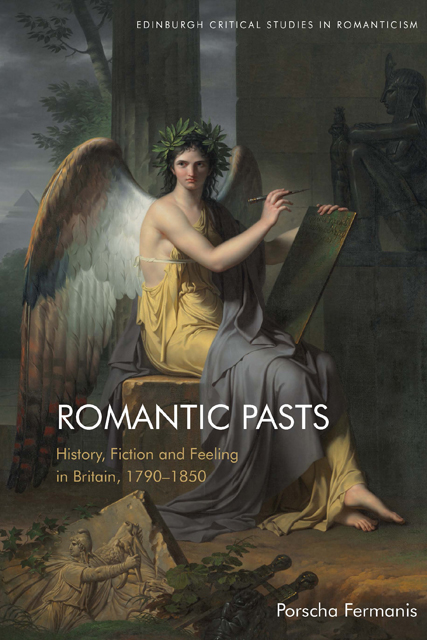Book contents
- Frontmatter
- Contents
- Acknowledgements
- Abbreviations
- Miscellaneous Frontmatter
- Introduction: Romantic Histories of Feeling
- 1 Historical Sentiment and Experience: Burke and Wollstonecraft
- 2 Historical Subjects and Ethical Character: Godwin and Carlyle
- 3 Historical Ethnogenesis and National Feeling:Scott, Moore, and Southey
- 4 Historical Style and the Man of Letters: Macaulay and Carlyle
- 5 Historical Reviewing: Specialisation and Periodical Culture
- Epilogue: A Romantic Return?
- Notes
- Bibliography
- Index
5 - Historical Reviewing: Specialisation and Periodical Culture
Published online by Cambridge University Press: 18 November 2022
- Frontmatter
- Contents
- Acknowledgements
- Abbreviations
- Miscellaneous Frontmatter
- Introduction: Romantic Histories of Feeling
- 1 Historical Sentiment and Experience: Burke and Wollstonecraft
- 2 Historical Subjects and Ethical Character: Godwin and Carlyle
- 3 Historical Ethnogenesis and National Feeling:Scott, Moore, and Southey
- 4 Historical Style and the Man of Letters: Macaulay and Carlyle
- 5 Historical Reviewing: Specialisation and Periodical Culture
- Epilogue: A Romantic Return?
- Notes
- Bibliography
- Index
Summary
The first half of the nineteenth century undoubtedly saw the rise of the man of letters and the emergence of the popular historian, who attempted to situate his or her work in a literary marketplace newly dominated by the novel. Yet the idea that ‘generalists’ and ‘popularisers’ rejected learned discourse, and that specialised study stagnated over the course of the late eighteenth and early nineteenth centuries, has rightly been met with increasing scepticism. Historians of academic disciplines have demonstrated the extent to which popularisation and specialisation could be complementary rather than antagonistic in certain fields, from physics and biology to philosophy and poetry. Early nineteenth-century history-writing is usually seen as impervious, if not actively resistant, to specialisation. However, practitioners in the period could take a different view. The sense that technicity, jargon, and opacity were already pervasive in written history led T. B. Macaulay to contend repeatedly in review essays in the 1820s and 1830s that the historian needed to reclaim those aspects of the past that the novelist had appropriated following history's turn to its ‘present narrow limits’. If Macaulay urges his fellow historians to ‘assert the rights of history over every part of her natural domain’ and to return to those vernacular sources that historians had wrongly declared ‘beneath their dignity’, it is precisely because he found the histories of the period so technical and so dry.
Even as he rejects history's narrowing field, Macaulay presciently recognises that several forces were converging in Britain to encourage historical specialisation and the bureaucratisation of historical study, including the expansion of science and the elevation of scientific research models, the university reform movement and the institutionalisation of disciplines, and changes to cultural criticism and conceptions of intellectual elites. The period from the 1820s to the 1850s witnessed agitation for changes to proprietary and copyright laws, as well as attempts to organise the ‘disorganic Literary Class’ into guilds and other professional bodies. History, too, had its own protocol-generating organisations in the form of cooperative printing societies such as the Roxburghe Club and the Bannatyne Club. These societies and book clubs originated in the 1810s and 1820s in Scotland but soon sprang up across the British Isles to organise antiquarians and bibliophiles into working associations, and to fill the gap in printing and preserving historical documents not yet undertaken by the long-awaited Public Record Office (1838).
- Type
- Chapter
- Information
- Romantic PastsHistory, Fiction and Feeling in Britain, 1790-1850, pp. 147 - 177Publisher: Edinburgh University PressPrint publication year: 2022

